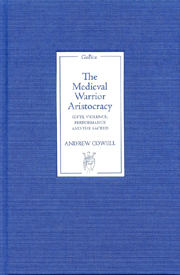Book contents
- Frontmatter
- Contents
- Acknowledgements
- Introduction
- 1 The Power of Giving
- 2 The Symbolic Constitution of the Giving Subject: William the Conqueror and Robert Guiscard
- 3 Violence and “Taking”: Towards a Generalized Symbolic Economy
- 4 Taking an Identity: The Poem of the Cid
- 5 The Sacred Kept
- 6 The Hero, Gratuity and Alterity: The Song Of Roland
- 7 The Supplemental Hero: Raoul of Cambrai
- 8 Female Integrity and Masculine Desires in The Nibelungenlied
- 9 Fractured Identities, and the Solution of Chivalry: William of Orange
- Conclusion: A New, Different Warrior Aristocracy
- Works Cited
- Index
9 - Fractured Identities, and the Solution of Chivalry: William of Orange
Published online by Cambridge University Press: 12 September 2012
- Frontmatter
- Contents
- Acknowledgements
- Introduction
- 1 The Power of Giving
- 2 The Symbolic Constitution of the Giving Subject: William the Conqueror and Robert Guiscard
- 3 Violence and “Taking”: Towards a Generalized Symbolic Economy
- 4 Taking an Identity: The Poem of the Cid
- 5 The Sacred Kept
- 6 The Hero, Gratuity and Alterity: The Song Of Roland
- 7 The Supplemental Hero: Raoul of Cambrai
- 8 Female Integrity and Masculine Desires in The Nibelungenlied
- 9 Fractured Identities, and the Solution of Chivalry: William of Orange
- Conclusion: A New, Different Warrior Aristocracy
- Works Cited
- Index
Summary
As seen in chapters 6 and 7, The Song of Roland, Raoul of Cambrai, and Gormont and Isembard examine the spectacular and often catastrophic consequences of crossing the boundary between social reciprocity and heroic, asocial integrity, for both the individual hero and the warrior aristocracy as a whole. Those texts emphasize the dangerous potential of the integrity-drive which underlies the performative system of giving and taking. But they also signal – through the specifically literary persona of the hero – their speculative and reflective nature and the supra-real quality of the events they narrate. The hero's gratuitous breaking of social reciprocity is also a breaking away from immediate identity with the epic audience itself. Despite the catastrophic violence narrated in the texts, they all insist on the redemptive possibilities of the act of narration itself as a social ritual and a form of reciprocity.
The mid-twelfth-century Coronation of Louis, part of the Old French William of Orange cycle, offers both a more comic and ultimately a more pessimistic view of the efficacy of performance. It portrays its hero, William of Orange, in a Quixotic light at times, and points to a continuing aristocratic fantasy – or better, nostalgia – for a sacred kept beyond the limits of reciprocity, which performance-based social structures seem unable to deliver. Like The Nibelungenlied, this epic offers a solution to the dilemma, but in this case, the solution lies in a reorientation of the integrity drive within the context of monastically-envisioned Christianity and a strongly religious conception of Chivalry.
- Type
- Chapter
- Information
- The Medieval Warrior AristocracyGifts, Violence, Performance, and the Sacred, pp. 153 - 169Publisher: Boydell & BrewerPrint publication year: 2007



